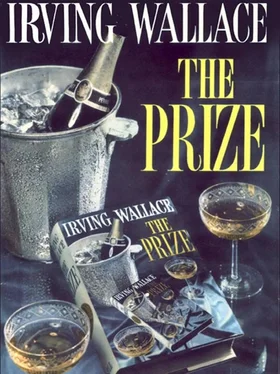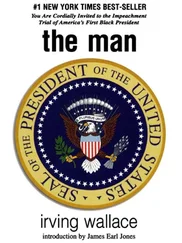Stratman pushed his plate aside. He was still calm, but he missed his meerschaum. ‘Freedom breeds its own canker sores,’ he said. ‘The coloured man was once slave, now he is only half slave, soon he will be free. Under Communism, Germans will never in our lifetime, or after, be free. We, in America, have hope. You have none.’
‘Max, I do not want to argue with an old friend. I want nothing of politics and neither do you. Max, I want you with us. It is simple as that. Not in Russia. Not in America. In Germany. And if, for personal reasons, it cannot be in Germany, I will compromise. I will let you do your work in a neutral climate- Sweden, Switzerland, as you wish-as long as the work you do is for us. Why? Because to work for America or Russia is not to work for peace. But to work for your Fatherland, which with strength will enforce peace, that is the only sense for all of us.’
Stratman sighed, and tried to maintain a pleasant demeanour. ‘Do not waste your energies on me any longer, Hans. I see you did not arrange this lunch to speak of Walther, but to proposition me. It is no use. If I took your money, I could not face myself or my niece Emily, or the ghosts of Walther and Rebecca. I am an American now, Hans, and so I shall remain to the last of my days.’
There had been many shifts of emotion on Eckart’s countenance, and the one that deliberately remained was of friendly resignation.
‘Well, Max, I respect your feelings. You cannot blame me for trying to hire the world’s foremost physicist, can you? It would have been a fine feather in my cap. But your work is so important, I pray you point it towards peace.’
‘Let me care for my own child, Hans.’
‘How long are you remaining in Stockholm?’
‘Until the day after the Ceremony-the eleventh, I think it is-just time enough to pick up my cheque. I may take Emily to Paris for a week. Every girl should see Paris once. After that, I sail for home. There is much I have to do. And you, Hans?’
‘I have some other business. I may stay a few days longer.’ He hesitated, then resumed. ‘Max, if ever you should need money, and wish to reconsider-’
‘At my age, I will not need more money. I have my salary. It is generous. And now, I have Nobel’s legacy.’
That moment, Eckart hated the Nobel Prize, which, ironically, had given Stratman the independence to reject his offer. But, at the same time, the prize had been necessary to bring Stratman here so that he might be tempted. Eckart’s own design, and Krantz’s execution of it, had been intelligent, correct. It had quite simply backfired.
‘People are known to change their minds,’ said Eckart hopefully. ‘Possibly, one day, I can make the inducement higher.’
‘Never high enough.’
‘I can hope. We shall see… Will you have a dessert, Max?’
Stratman shook his head. ‘No. I think I have had just about all I can stomach for one day.’
Except for the inadequate circles of artificial light thrown by the street lamps, the city of Stockholm was pitch-black at 5.40 in the afternoon, the time when Andrew Craig returned from the Stock Exchange Hall to his suite in the Grand Hotel.
The last lecture had been successful, but enervating. Despite his physical weariness, he felt at peace within himself. The reception accorded him by the university students, and their faculty, had shored up his writer’s pride, and it reinforced the tenuous structure Jacobsson had built for him at the Swedish Academy on the ruins of his old self. The frivolous lunch with Emily, in the Stratman suite, had also played a positive part in his well-being. Gradually, Emily was beginning to accept and trust him, and for the first time in three years, he was enjoying companionship with a young woman of his own choosing.
The terrible guilts of the night before, revived by Leah’s hysterical offering, he had managed to put aside. What remained in mind was the vivid sensation of Emily’s living presence, and the growing knowledge of his own rights and his own worth. This precarious resurrection of himself, as author and man, had made him vow, in the late afternoon, that he would not again drown himself in drink.
The fact that now, sprawled on the sofa of his sitting-room, he held a double Scotch with water in his hand was in no way a breaking of the vow. Craig knew his history as a drinking animal. There was the normal Craig, in the indistinct Harriet days, who, like most men, would have a relaxing double before dinner, and no more. And there was the suicidal Craig, of recent years, who would have a compulsive fifth or more, after the double, in the daily descent to oblivion.
Tonight-it was already 6.14-he was the normal Craig, with the relaxing double before dinner, and there would be no more.
He was appreciative of his solitary confinement in the suite. He would like to have had dinner with Emily, of course, but she had promised to accompany her uncle, and members of the Royal Swedish Academy of Science, to the opera. On the other hand, if the opera took away pleasures, it gave them, too. For, upon arriving in the entry hall, he had found a brief note from Leah that she was off to dinner with Mr. Manker, and then, like Emily, to the opera, also. He wanted none of Leah this night, and so he blessed the opera, and he drank his drink.
He enjoyed being alone to reflect. And he enjoyed his drink, because it would be his only one, and he could taste and savour it and not use it as a lethal potion. What would he do this evening? He would buy some American magazines at the news-stand in the lobby, dine by himself at an isolated table in the Winter Garden, and then come back to the suite. He would change into his pyjamas, crawl into bed, make some notes on Return to Ithaca -several ideas for scenes had occurred to him in the last day or two-and then read a new English biography of Kierkegaard that the students of Uppsala had given him. He would fall asleep early, and awaken early, refreshed, and take Emily out for breakfast and a long walk.
He finished his drink, went into the bathroom, rinsed the glass and left it beside his toothpaste, found his tie and knotted it for dinner. He had pulled on his dark grey suit jacket, when he thought that he heard someone at the door. He went to the curtain and listened. The knocking was repeated.
He hurried to the door and opened it.
A young lady stood beyond the door frame, in the corridor. ‘Hello, Mr. Craig,’ she said.
He did not recognize her. A Robin Hood hat was tilted above her auburn bangs. She had a nose like the beak of the common tern. Her lips, closed, seemed to give her no more than one lip. She was garmented in a thick coat of military cut, and under an arm, like a diplomatic pouch chained to a wrist, she carried an oversized black leather handbag.
As she prepared to introduce herself again, her eyes began to blink disconcertingly, and Craig immediately established her identity. ‘Don’t you remember?’ she asked. ‘I’m Sue Wiley of Consolidated Newspapers.’
He remembered, and he wanted to slam the door in her face, but he was too sober for rudeness. ‘What can I do for you?’ he said coldly. ‘Or are you here to see if I can walk a straight line?’
‘I’m sorry that upset you so, Mr. Craig. I was only doing my job. How am I supposed to get stories, if I can’t ask questions?’
‘There are jobs and jobs,’ said Craig. ‘Lizzie Borden had a job, too.’
‘She was acquitted,’ said Sue Wiley. ‘Look, Mr. Craig, I told you I’m sorry if-’
‘I’m not going to invite you in,’ said Craig, ‘and I’m not just going to stand here. Tell me what you want.’
‘I have someone downstairs who’d like to meet you-someone I think you’d want to know-’
‘Who?’
‘At your press conference you praised Gunnar Gottling as the most talented writer in Sweden. He’s in the lobby. I promised to introduce you.’
Читать дальше












